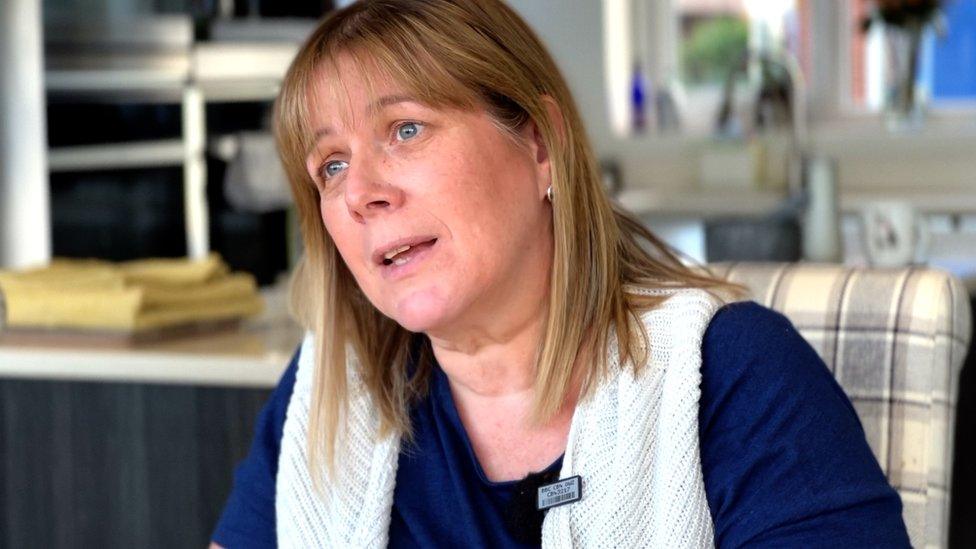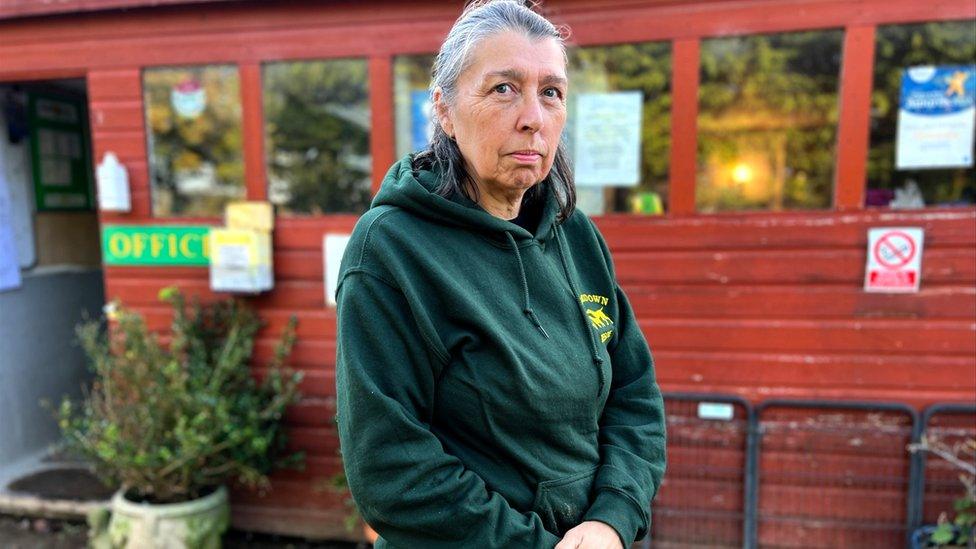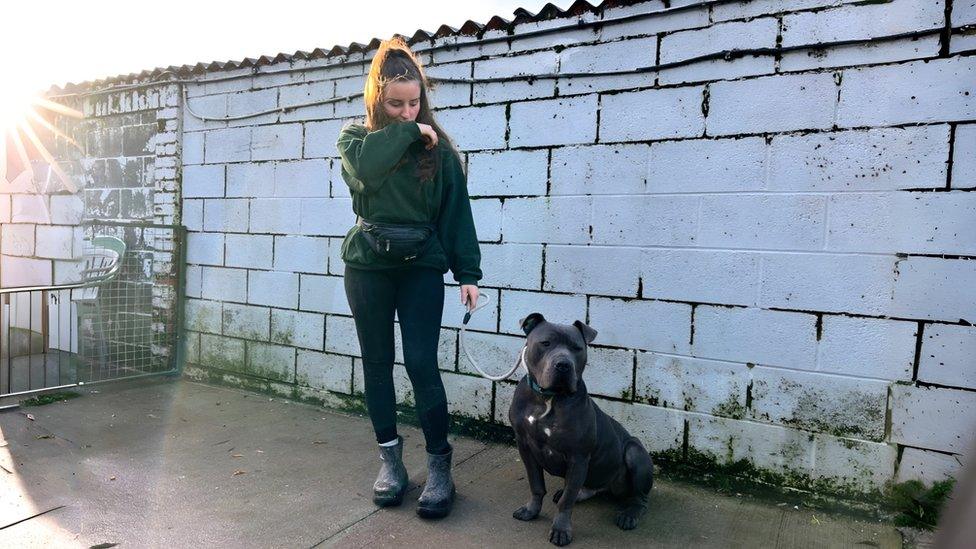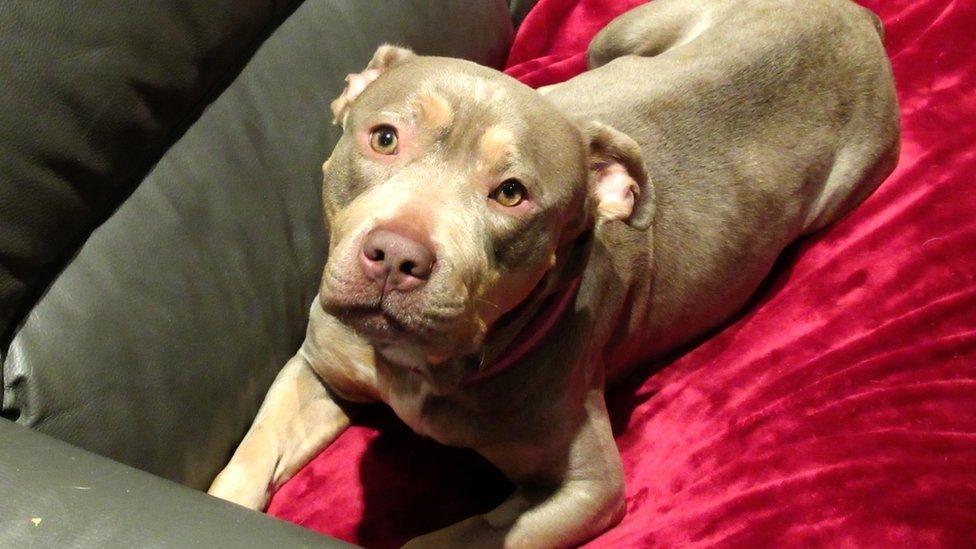American bully XLs: Pounds 'killing up to eight dogs a day'
- Published

Many of these recently abandoned dogs have already been put to sleep
A ban of American bully XLs has led to dogs being abandoned and "killed en masse", the founder of a pet rescue centre has said.
People who work to rehome dogs have told the BBC some pounds are killing up to eight strays a day.
The vast majority are understood to be bully XLs, which are being added to the list of banned dogs from 1 February.
The Department for Environment, Food and Rural Affairs (Defra) said it had taken action to protect the public.
XLs are variations of American bullies, which originated in the US in the 1980s.
They are being added to the list of banned dogs in England and Wales because of links to a number of fatal attacks, including most recently on a man in Walsall.
Days earlier, an 11-year-old girl, along with two men, were attacked by an American bully XL in Bordesley Green, Birmingham.
The BBC has spoken to dozens of dog experts, including charity workers, vets and wardens.
They claim that since the ban was announced in September, large numbers of dogs have been abandoned, exacerbating an acute shortage of kennel and rescue spaces.
Pounds holding unclaimed strays can ask for them to be put to sleep by a vet after seven days.

Holly Maitland has spent 13 years working to rehome abandoned or neglected dogs
"By any other name it's a cull," says Holly Maitland, 55, who founded East Anglia Dog Rescue.
She is part of a network of 'pound-pullers' who try to rehome dogs from council-funded stray kennels.
"Occasionally dogs were put to sleep [in the past], but this is en masse, it's a tsunami - vets are going to have to kill dogs like never before," Ms Maitland said.
Owners of dogs that meet the government's definition of an American bully XL, external have until 31 January to put them to sleep, for which they can claim £200 compensation.
Alternatively, those wishing to keep their dogs must have them microchipped, insured, neutered and muzzled outdoors.
A certificate of exemption will also have to be purchased for £92.40.
"The human cost is two-fold," Ms Maitland said.
"Owners will have to explain to their children that the family pet they adore can't stay because they don't have enough money, or their social housing agreement excludes them from owning a banned dog.
"And people in rescues are falling apart over this because it's turning us into murderers and that is not acceptable."
After 31 December, rescue centres will not be able to rehome XL bullies in their care and most will have to be killed to free up space.

How many healthy dogs are being killed?
There is no public record of the number of dogs that are put to sleep in the UK.
Council data obtained under the Freedom of Information Act varies wildly and appears to be incomplete.
BBC East asked IVC Evidensia, the charity PDSA, the British Veterinary Association, the Royal College of Veterinary Surgeons and Vet Compass for any relevant data they had.
None was able to provide anything.
However, rescue workers who take dogs from stray kennels in the East of England, London and the East Midlands said the local pounds were putting to sleep between three and eight dogs a day, mostly bully breeds.
This would suggest that nationwide, large numbers of healthy or treatable strays are being destroyed each week.
A vet in the East of England who wished to remain anonymous said her practice was putting to sleep around 15 XLs a week.


Julie Shelton, who runs Appledown dog rescue, says the system of rehoming dogs is at breaking point
Julie Shelton, 61, runs Appledown, which is part rescue, part stray kennels in Dunstable, Bedfordshire.
She has 96 dogs - more than ever - and gets around three requests a day to take in bully breeds.
"I have never known it like this - it's the worst the system is at breaking point," she said. "Nobody has space anymore and people get very shirty when we can't take their pets.
"One of the problems over the past few years is that people are more interested in how a dog looks than what they are, and breeders for the wrong reasons have put all these large dogs into the pet market."
Appledown has two dogs that meet the American bully XL description; Sheba, who is five years old, and a cane corso cross called Kylo.
Ms Shelton says Sheba has "a lovely temperament" and she will look at getting her exempted if a home cannot be found.
"A lot of rescues with XLs will have to see what's the least bad option for them," she said.

Sophie, a volunteer at Appledown, with Kylo, a cane corso cross that is likely to be placed under the XL bully ban
American bullies could be one of the country's most populous breeds.
The American Bully Kennel Club says it has 97,000 dogs registered in the UK, but many more are likely to be unregistered.
Until recently, XL puppies with unusual colours could fetch several thousand pounds.
However, their value has plummeted and many, particularly those used for breeding, have become a costly liability.
On the UK's largest online pet marketplace, Pets4Homes, hundreds of American bullies are being sold, some for as little as £75; unchipped, unneutered and unvaccinated.
Pets4Homes did not respond to our request for a comment.
Meanwhile, there are hundreds of posts in rehoming groups on Facebook in which XLs are being given away.
The BBC has learnt that some rescue centres have resorted to shipping the dogs to Ireland, where they are still legal.

Bertie is a bully cross who was abused by his owner and handed to Colchester K9 Rescue
Colchester K9 Rescue has three dogs that fall under the terms of the ban and must be rehomed by the end of the year.
Two of them, Bertie and Doris, are four-month-old puppies who were found dumped at a kennels earlier this month, scarred and emaciated.
Tanya Malone, who founded the not-for-profit organisation, claims rescues "are facing a huge increase in the number of abuse cases involving XL bully type dogs".
"Entire litters of puppies are being handed in, often in need of immediate medical attention, with clear signs of neglect," she said.

Saffron, a bully XL, was taken to a rescue in Northamptonshire after being abandoned while heavily pregnant
The Essex-based campaign group Tuk's Law is calling for the euthanasia of all dogs to be centrally recorded.
Spokeswoman Sue Williams said the ban meant "thousands of healthy dogs will be destroyed for nothing more than the way they look".
"This whole thing has been handled abominably - there has been no consideration of the mental health of vets, rescues or owners who will watch these dogs walk into a room and leave in a bag," she said.
"That's the reality being faced and none of it should be hidden."
A Defra spokesperson said it had taken "quick and decisive action to protect the public from tragic attacks" by making XL bully type dogs a prohibited breed under the Dangerous Dogs Act.
"Up until 31 January 2024, owners of XL bully type dogs have the option of applying for a certificate of exemption or taking their dog to be euthanised by a vet," they said in a statement.
"We are working closely with the police, veterinary experts and animal welfare groups as we take forward these important measures."

Follow East of England news on Facebook, external, Instagram, external and X, external. Got a story? Email eastofenglandnews@bbc.co.uk, external or WhatsApp us on 0800 169 1830